|
Pushkin, Mozart and Other Famous Anonymous Creators
Julia Bederova
Photos by Alex Antonov
Tatiana Grindenko's new ensemble, Opus Post, made its debut at last year's international new music festival, Jazz Off.
Afterward there were a few extraordinary performances that made her group the greatest sensation of the season in the
genre of so-called "serious," or academic, music. Opus Post was a new phenomenon in contemporary music, yet it was
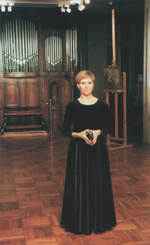 also a group comprised of skilled Baroque and classical musicians. For Ms. Grindenko, a violinist, and her musicians
- violinists, violists, a flute player, a cellist, a bassist, and a clavichordist - playing contemporary music was
hardly a new departure.
also a group comprised of skilled Baroque and classical musicians. For Ms. Grindenko, a violinist, and her musicians
- violinists, violists, a flute player, a cellist, a bassist, and a clavichordist - playing contemporary music was
hardly a new departure.
Until 1999, Ms. Grindenko performed works of contemporary Russian and Western composers under the auspices of
the Academy of Ancient Music. From a formal point of view, these performances were the dalliances of a master of
instrumental Baroque music. But before coming together as Opus Post, the ensemble members had long since come to
see the role of music - and of the composer and musician - in a very dramatic and unusual way. Their performing credo
became one that focused on the music itself, and on new interpretations - one that also radically downplayed the
status of both the performer and the composer.
The idea for such a new project - one that does not center around performers, but rather around new ways of
representing material, new visuals, and a particular playing style - sprang from composer Vladimir Martynov's
enormously provocative concept that "the era of composers who see themselves as creators with a capital C is long
over." He recommends "submerging in the flow," citing Claude Levi-Strauss's term bricolage (puttering, doing odds
and ends) as a way of stringing together a number of elements strictly in accordance with an ancient canon.
According to Mr. Martynov, a composer is a person who "creates ponds in the flow of time;" and a bricoleur is
not a creator, but someone who lets the time flow go freely through him. A leading Russian expert in medieval
music, Mr. Martynov cuts the forms that overturn listeners' expectations from elements of varied music - Russian
medieval, folk, Western European, Renaissance, Baroque, classical - and Romantic language. All this structure
would have been a waste of frenzied neotraditionalism had it not been for the paradox of Mr. Martynov's radicalism,
reflected in every musical structure, in every sound, or in any unexpected absence of sound. It is not postmodernist
irony, but a coarse intellectual provocation; and the music, varying between a deafening vacuum and phantasmagoric
drive, transforms Mr. Martynov's work into a pleasure for the unsuspecting, and into a riddle for experts.
Ms. Grindenko's group plays Mr. Martynov's music as a hymn, as their own program manifesto, and as a trump card.
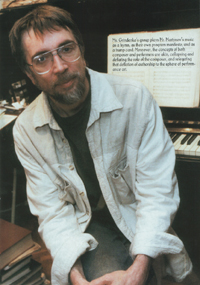 Moreover, the concepts of both composer and performers are akin, collapsing and deflating the role of the composer,
and relegating that deflation of authorship to the sphere of performance art. Both Ms. Grindenko and the musicians
of Opus Post accentuate the triumph of anonymity (if there is neither an author nor a performer in the role of the
author, then there is only anonymity). By covering their faces with masks and their bodies with theatrical gowns,
they create a strange image that is equally reminiscent of monasticism and the carnival. The group's performance is
carried out not by playing a number of compositions, but as a flickering ritual, an artful and graceful balance
between the canon of craft and an aesthetic game. Huge revolving structures designed last year by Anna Koleichuk
were suspended from the ceiling in Tchaikovsky Hall, and then taken around to various other halls by the group.
The group even took their wares to St. Andrew's Church, where they were headline performers in St. Matthew Passion,
a new project encompassing music, poetry and the performing arts, created by an assortment of modern
composers and literary figures. This season the ensemble is working with another designer, Francisco Infante,
and is likely to produce some exquisite musical performances over the coming winter.
Moreover, the concepts of both composer and performers are akin, collapsing and deflating the role of the composer,
and relegating that deflation of authorship to the sphere of performance art. Both Ms. Grindenko and the musicians
of Opus Post accentuate the triumph of anonymity (if there is neither an author nor a performer in the role of the
author, then there is only anonymity). By covering their faces with masks and their bodies with theatrical gowns,
they create a strange image that is equally reminiscent of monasticism and the carnival. The group's performance is
carried out not by playing a number of compositions, but as a flickering ritual, an artful and graceful balance
between the canon of craft and an aesthetic game. Huge revolving structures designed last year by Anna Koleichuk
were suspended from the ceiling in Tchaikovsky Hall, and then taken around to various other halls by the group.
The group even took their wares to St. Andrew's Church, where they were headline performers in St. Matthew Passion,
a new project encompassing music, poetry and the performing arts, created by an assortment of modern
composers and literary figures. This season the ensemble is working with another designer, Francisco Infante,
and is likely to produce some exquisite musical performances over the coming winter.
Opus Post programs are constructed according to diverse artistic influences. They may include the stochastic
whistling noises of scores written by Yanis Ksenakis, a Paris-based Greek composer, architect and mathematician,
passionate leftist, progeny of Le Corbusier, and a participant of the 1968 Paris uprising; the comfortable rustle
and passionate muttering of the music of Alexander Bakshi, a Russian avant-garde composer; the hard logic and
crystal structures of Russian post-minimalist Anton Batagov; or even Russian conceptualist Vladimir Martynov's
magic and charming curtsies to archaic cultures and languages.
Meanwhile, the same ensemble performs under the name "Tatiana Grindenko's Ancient Music Academy," playing
glamorous and festive Baroque music. And it's the very same ensemble that, when playing with Andrey Kotov's choir,
Sirin, turns Anatoly Vasiliev's theatrical performances at his School of Dramatic Art into happenings that stump
theater critics. Their musical adaptation of Alexander Pushkin's play "Mozart and Salieri" and their performance
of Vladimir Martynov's "Requiem" include so many scores that it would be more accurate to describe them as musical
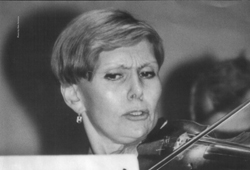 performances organized by the director, the composer, and the musicians. The legend of Mozart's death by poisoning,
as interpreted by Pushkin, merges in the show with the myth of Mozart himself - a myth so great that it suffocates
his music - and with the myth of Pushkin, which, as interpreted by the director, in turn suffocates Pushkin's poetry.
This recursion is finally interpreted through the music of Vladimir Martynov, coming to life in the movement and the
words of the actors and in the movements of the orchestra. After the complicated myth of the plot structure is leveled,
after all the semantic hallucinations in Pushkin's text are removed, only the unprecedented lyrics of the sound remain.
performances organized by the director, the composer, and the musicians. The legend of Mozart's death by poisoning,
as interpreted by Pushkin, merges in the show with the myth of Mozart himself - a myth so great that it suffocates
his music - and with the myth of Pushkin, which, as interpreted by the director, in turn suffocates Pushkin's poetry.
This recursion is finally interpreted through the music of Vladimir Martynov, coming to life in the movement and the
words of the actors and in the movements of the orchestra. After the complicated myth of the plot structure is leveled,
after all the semantic hallucinations in Pushkin's text are removed, only the unprecedented lyrics of the sound remain.
Music turns out to be author, protagonist, and object of total deconstruction all in one. And the artistic
deconstruction itself suddenly seems an enchanting musical feat that can only be accomplished by someone like Ms.
Grindenko, who is closely familiar with ancient music, the crystal perfection of classicism, and the new music,
including all the myths associated with it.
The general thrill of both ancient and new music was characteristic of the 60's. When the musicians of that era
played their mixture of avant-garde, Renaissance, and Baroque, it was as though they were reciting a manifesto of
their disobedience to fossilized philharmonic dogmas. As philharmonic standards gradually loosened, ancient and
modern music slowly became the subjects of narrow musical specialization and developed traditions and schools.
The pathos surrounding the idea of opposing the standard by way of infatuation with marginal music forms became
extinct. Today the Russian performers equally loyal to both ancient and modern music can be counted on one hand.
Very few musicians recognize that such nontrivial combinations can give rise to creative freedom, intellectual
innovations, and artistic fray.
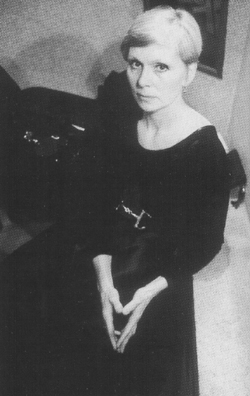 Violinist Tatiana Grindenko is one of these few. Born in Kharkov, she started studying music at the age of six,
preferring the violin to her ballet classes. She became a student of Boris Sergeyev at the Leningrad School, and
later went on to the Central Music School, then the Moscow Conservatory, where she was a student of Vladimir
Yankelevich. In 1968 she won a gold medal and a special Orpheus prize at the IX Annual Youth and Student Festival
in Sophia. In 1970 she won first prize at the IV Annual Tchaikovsky Competition. In 1972 she won prizes at the
Wieniawski Competition in Warsaw. Currently she works as a solo violinist. Her stage partners include Gideon Kremer,
Gennady Rozhdestvensky, Kurt Mazur, Yevgeny Mravinsky, Hans Holliger, Oleg Meisenberg, and others. She plays with
the world's best orchestras, including the London Symphony Orchestra, the Radio France Symphony Orchestra, the Vienna
Philharmonic Orchestra, and the Leipzig Gewandhaus Orchestra among others. She has headed the Ancient Music Academy's
orchestra for more than ten years now.
Violinist Tatiana Grindenko is one of these few. Born in Kharkov, she started studying music at the age of six,
preferring the violin to her ballet classes. She became a student of Boris Sergeyev at the Leningrad School, and
later went on to the Central Music School, then the Moscow Conservatory, where she was a student of Vladimir
Yankelevich. In 1968 she won a gold medal and a special Orpheus prize at the IX Annual Youth and Student Festival
in Sophia. In 1970 she won first prize at the IV Annual Tchaikovsky Competition. In 1972 she won prizes at the
Wieniawski Competition in Warsaw. Currently she works as a solo violinist. Her stage partners include Gideon Kremer,
Gennady Rozhdestvensky, Kurt Mazur, Yevgeny Mravinsky, Hans Holliger, Oleg Meisenberg, and others. She plays with
the world's best orchestras, including the London Symphony Orchestra, the Radio France Symphony Orchestra, the Vienna
Philharmonic Orchestra, and the Leipzig Gewandhaus Orchestra among others. She has headed the Ancient Music Academy's
orchestra for more than ten years now.
If anyone could be said to lay claim to the romantic fame of Klara Vik, Schumann's legendary partner and a virtuoso
musician in her own right, it would be Ms. Grindenko. In addition to her great beauty, she has enough solemnity
to keep the balance between romantic fleur and the spirit of an iron lady intangible yet convincing. Having waved
away a successful career in academic music that the painfully narrow "standard" music world had offered her, Ms.
Grindenko chose to create her own unique orchestra, playing ancient and modern music.
Passing through Moscow for a few hours, sometimes to change her clothes, sometimes to give a concert, she dives
into a silver Volvo like other girls might dive into a foam bath. It seems, though, that she feels most comfortable
in a racing car. Furthermore, she seems to prefer rear-wheel drive, especially in a Porsche. Actually taking part in
sports-car races has taught her the relativity of mistakes, saying that when you mess up a violin passage, a bad
intonation onstage is merely unpleasant. If you make a mistake while driving a car, however, the consequences can
be more significant. And still she sometimes plays as if she were driving her favorite Porsche - devoutly, tactfully,
with an elegant but rather apparent passion. And it's not all about the possibility of making a mistake, but rather
that when doing something important, it is as impermissible to make a mistake as when you are in a race. You may ask
Grindenko, who looks high-society, what else is as precious to her as Baroque music and cars, and she will tell you
how she learned to play Spanish Rhapsody by Lalo (the most classical repertory) when she was a student influenced by
Ella Fitzgerald; or how she used to buy John McLaughlin, Deep Purple, and Pink Floyd on the black market, thinking
that all of it was serious music; or how she used to play in the "Boomerang" rock band, or how she passionately
participated in electronic music experiments.
There is always something more important than making a mistake in a passage. There are always places and
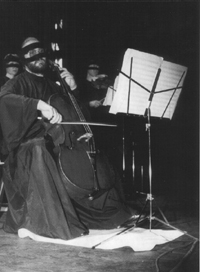 situations where any mistake is impermissibly silly. Ms. Grindenko claims that Professor Yankelevich, an a
cademician to the marrow, taught this philosophy to his progenies. Professor Yankelevich did not know the
secrets of ancient music, which later, after the victories at the international academic contests, enchanted
Ms. Grindenko. Yankelevich recited poems during classes. Not just recited. He stopped her playing Spohr's
music and recited the poetry of Gumilev and Apukhtin. Then he stopped her again, asking: "Did you understand
anything?" She thought she did. He stopped her again: "No, just listen to it..." And he recited again: "Who cares
about mistakes in passages?"
situations where any mistake is impermissibly silly. Ms. Grindenko claims that Professor Yankelevich, an a
cademician to the marrow, taught this philosophy to his progenies. Professor Yankelevich did not know the
secrets of ancient music, which later, after the victories at the international academic contests, enchanted
Ms. Grindenko. Yankelevich recited poems during classes. Not just recited. He stopped her playing Spohr's
music and recited the poetry of Gumilev and Apukhtin. Then he stopped her again, asking: "Did you understand
anything?" She thought she did. He stopped her again: "No, just listen to it..." And he recited again: "Who cares
about mistakes in passages?"
It was only when she and Gideon Kremer appeared on the big philharmonic stage together that they began
to play both classical and modern music - Alfred Schnitke, Arvo Pyart, Valentin Silvestrov, Luiggi Nono
(the avant-garde Italian composer who composed "Hay che caminar," which later became a cult piece, especially
for their duet). Then Mr. Kremer did not come back from a foreign trip. Ms. Grindenko remained in Russia.
In 1982, together with pianist Alexey Liubimov, they created the "Ancient Music Academy."
It is not often now that one can enjoy watching Ms. Grindenko on the Moscow formal, academic stage.
She is not a philharmonic enthusiast, because there is no interest in such philharmonic enthusiasm.
If you want to hear Ms. Grindenko either as a romantic virtuoso violinist or as an iron lady who elegantly
manages her orchestral projects, you must look for diverse concert announcements, though not only the
philharmonic ones. Watch for announcements for the Moscow Autumn or Alternativa music festivals. Still,
Ms. Grindenko and her orchestra appear at such events only on special occasions, or when they have an
opportunity to perform their own material.
Mr. Martynov writes the majority of his music specifically for Ms. Grindenko because she is the only
person who can give this specific sound to his musical language, tongue-tied moments alternating with a
solemn ritual boom. That's what he says on the rare occasions he shows someone his scores. "You can have
a look if you want, but she is the only one who could play it," he says. "It has to be a folk-tune by village
fiddlers. Only she can do this."
It's true. Ms Grindenko and her chamber orchestra could play this music somewhere between frenzied rock
and unmeasured Baroque, with fluid forms, blurred silhouettes, evasive body-movements, and that strange spirit
of freedom. You can always choose to perceive Ms Grindenko's music and theatrical performances either as a
wonderful bagatelle or as an aethetic provocation.
Capital Perspective, Dec2000-Jan2001
|
|
|
|

World premiere of complete work
February 18, 2009
London Royal Festival Hall, United Kingdom
Vladimir MARTYNOV, Opera VITA NUOVA
More InfoThe Monk Thogmey's Thirty-Seven Precepts - new disk of Anton Batagov is released
More InfoThe 1st International Festival of Joint Projects "Amplitude"
25th, 28th of September
More InfoLONG ARMS FEST- 4 (2007)
September 27-30, October 6-27 -- FOURTH presentation of the MAIN INTERNATIONAL VANGUARD FORUM OF TWO CAPITALS -- LONG ARMS in Moscow and APOSITION FORUM in St. Petersburg.
More Info
10 April, 2007, concert In memory of Nick DMITRIEV
Dom Cultural Center
more info
13, 14 of November, 2006 Moscow Composers Orchestra on London Jazz Festival
More InfoLONG ARMS FESTIVAL - 3
September 27 - October 4, Moscow, 2006 DOM Cultural Centre
More Info
8, 9, 10 of July 2006 the play "Mozart and Salieri. Requiem" by Vladimir Martynov music.
14, 16, 17 of July the play "Song XXIII. Interment of Patrokl. Games" by Vladimir Martynov music
More Info10th of April, 2006
Nick, we remember you...
A film about Nick Dmitriev is now available for download. The film was shown in 2004 on Russian Channel TV Culture
DivX (300 mb) download now
23d of November - 2nd of December, 2005
5 performances of "Unorthodox Chants" Project in UK and Belgium
More Info17th-19th of November, 2005 Festival in Tokyo in memory of Nick Dmitriev
More Info1st-10th of October 2005, Long Arms Festival - 2
in memory of Nick Dmitriev
see website
1st of July, 2004, 19:00
OPUS POSTH Ensemble performs THE SEVEN LAST WORDS OF OUR SAVIOUR ON THE CROSS by Joseph Haydn
Kozitsky lane., house 5 metro Puschkinskaya, Tverskaya, Chekhovskaya information - 299-2262
LONG ARMS
new music festival in memory of Nick Dmitriev  from May 15 till 19 IN CONCERT STUDIO M.Nikitskaya str., 24
organized by DEVOTIO MODERNA CENTER and RADIO CULTURE GTRK composers Martynov, Batagov, Karmanov, Aigi, Zagny, Pelecis, Rabinovich, Semzo, Glass, Dresher and others performers Tatiana Grindenko, Galina Muradova, OPUS POSTH ensemble, Anton Batagov, Sergei Zagny, Alexey Aigi, 4.33 ensemble, Tibor Semzo, GORDIAN KNOT ensemble, ALKONOST choir and others book tickets
|







